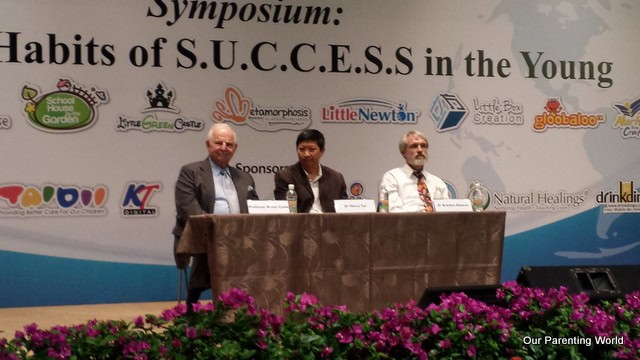The symposium featured the creator of the Habits of Mind framework, Professor Arthur Costa, Emeritus Professor, Education for State and Founder of The Institute for Habits of Mind, USA (left in the photo), Dr Branton Shearer, neuropsychologist and founder of Multiple Intelligences Research and Consulting, USA (right in the photo) and Dr Henry Toi, Executive Director of The Art Costa Centre for Thinking and Affiliate Director of Habits of Mind, Singapore and also the creator of Habits of S.U.C.C.E.S.S. (middle in the photo).
At the 2012 National Day rally, Prime Minister Lee Hsien Loong urged educators and parents alike to “prepare every child for a test of life, and not a life of tests”. In today’s increasingly competitive arena, our children need to be educated in a manner that prepares them for a VUCA (Volatile, Uncertain, Complex, Ambiguous) world.
Global Eduhub, a leading preschool chain with 36 centres located in Singapore, Australia and China, is set to take the initiative with its first-ever symposium in innovative thinking for early childhood. It launches Hybrid Pedagogy of Habits of Mind and Multiple Intelligences after 18 years of early education research. Its pilot programme is to be introduced in all Mulberry Preschools in 2015 with the aim to prepare children for a VUCA world.
Themed ‘Nurturing Preschoolers’ Habits of S.U.C.C.E.S.S’, and in partnership with The Art Costa Centre for Thinking, the symposium featured the creators of 2 well-known frameworks that have proven to define success in adults, and Global EduHub’s own hybrid pedagogy that distills the essence of these frameworks into a curriculum that can be implemented at the early education level.
The symposium targeted for early educators and parents, hopes to raise awareness for this need for a shift in thinking about early education pedagogy.
Our Parenting World is honoured to interview Professor Arthur Costa, founder of the worldwide movement for Habits of Mind to instill patterns of success in individuals.
1) Can you tell us more about what are Habits of Mind?
Habits of Mind are dispositions that are called forth when one is confronted with confusing problems and complex decisions, the resolutions to which are not immediately apparent. They have been found to be characteristics of successful people in many walks of life: athletes, artists, entrepreneurs, journalists, scientists, etc.
2) How did you and Dr Bena Kallick decide and come up with what are the 16 thinking approaches to help students tackle complex problems?
About 25 years ago I edited a book entitled, Developing Minds: A Resource book for Teaching Thinking. I invited cognitive psychologists, philosophers and educators from around the world to contribute chapters. As I was editing, I began to see a lot of commonalities of what are the characteristics of successful problem solvers in many walks of life. Although they did not use the same labels, the intentions were similar. I began to classify these dispositions. I started with 7 but the list began to grow—10, 12 and over the years we studied and added more. We now have 16 but that may not be a final number. Our hypothesis is that if these are the attributes of successful people, can we teach them to students so that they will be successful in school, in work, in college and in life.
3) In your personal opinion, what are the more important habits for success?
While they are all important there are some that research has shown to be significant:
Metacognition: Thinking about and being aware of our own thinking, behaviors, emotions and our effects on others.
Managing impulsivity: Self regulation and emotional control
Persisting (Grit): Sticking to a task to achieve our goals
Thinking Interdependently: Collaboration and concern for others
Remaining open to continuous learning — Lifelong learning.
4) How can parents help their child to better prepare for the future?
Parents are the first teacher so their role is of primary importance. Talking with and reading to children is essential. Keeping children in good health—disease free, stress free, and good nutrition. Remember that parents are models for their children. Children are always learning from and imitating their parent. So, it’s important to demonstrate these habits of mind in front of their children: Persisting, managing impulse, asking questions, learning from mistakes, wonderment and awe, problem solving, etc.
Thank you Professor Arthur Costa for taking our interview and sharing your valuable insights with us!
More about Habits of Mind, developed by Professor Arthur Costa and Dr Bena Kallick, this set of 16 thinking approaches has been used by schools across the world to help students to tackle complex problems. The 16 Habits of Mind has also been incorporated into the Gifted Education Programme (GEP) in Singapore. More recently a school in Singapore won the Lee Hsien Loong award for its practice of the Habits of Mind. Global EduHub is the first preschool in the world to fully integrate the Habits of Mind into its curriculum and teaching practices. Global EduHub is in the process of being certified as the first Habits of Mind preschool in Asia by the Institute for the Habits of Mind, founded by Professor Costa.
To find out more about Global EduHub and its education centres, please click HERE.





